
Objectives for Awesome Encounters
What's an objective?
D&D combat can devolve into mindless attack, wait, and repeat. Bring intensity and drama to your table by designing encounters around story point objectives, rather than simply parading enemies to kill.
Step 1: Goal and Hazard
Building an encounter has three phases. First, identify a goal, an obstacle or hazard, and something the team is trying to protect. Players can discover the goal, the hazard, and what to protect, by interacting with NPCs.
Encounter examples
| Goal | Hazard | What must be protected |
|---|---|---|
| Information. A noble signed a secret order for the death of someone. Find out whom and alter the order, if necessary. |
Discovery. The order was last seen in the nobles's study in a locked desk, in a guarded castle |
Anonymity and an Ally. Your friend/patron's life may be in danger. But if your attempt is discovered, the chance is wasted and the noble will have open cause to execute your friend immediately (and possibly you). |
| Escape pursuers Bring powerful enemies to the combat that the team is not willing to face head on. Fleeing is the only option. | A crossing. Sections of a bridge are collapsing (random chance when stepped on), or small sections of ice (1 person at a time) are breaking and drifting, requiring jumps. Falling in moves you into the open, and exposes you to hazards in the water. |
An NPC, or a scroll, map, or evidence. Give the players something extremely valuable that water (or things in the water) can destroy. It could be made of paper or clay, or be a sick child or pet, or entrusted ambassador that would die from exposure. |
| Gain influence at a social event. Make influential friends that can support your cause and sponsor your activities, such as supporting your nomination or an impending vote. Your enemies will be there. | TMI amid mayhem. Your enemies will try to draw you out by making you use your powers and abilities. If you reveal too much about yourself, you will be exposed as outsiders and seen as a threat, undermining your cause. . | Bystanders, and your secrets. You must prevent bystanders from being harmed by your enemies, but also prevent others from knowing that you are magic users and outsiders. |
Step 2: The Four C's
Once you have a goal, a hazard, and things that must be protected, expand the encounter to include the four C's:
- Consequences Reaching or not reaching the objective will affect the story arc (beyond PC lives).
- Costs There are costs and risks associated with the objective.
- Choices PCs face decisions in order to reach the objective (with different risks).
- Creativity Reaching the objective invites creative problem solving.
Consequences
In books, authors use internal dialogue (characters thinking to themselves) to let the reader know what possible bad things could happen that they should be worried about. Great authors and experienced ones tend to use much more internal dialogue than new and less effective authors. In the ideal scenario, players discuss the possible consequences either among themselves, or with an NPC. This step can be quick, if the consequences are obvious, but a slow reveal (during the encounter!) of just how bad things are can be even more satisfying.
Put enough on the table to charge the intensity, but leave a little under the table to surprise them with after they've made their plans and passed the point of no return.
In crafting consequences think about the people, places, and things your PCs value. Then pick one (or several) near and dear to their hearts and stab!
Time-bound consequences can also be vital to intensity.
Costs
Gaining the objective should cost the players something. It could be time. It could money and chances. It could be that enemies slip away while they help locals. It could be a long rest missed. It could be that one ore more relationships are mortgaged. Alignments could even be at stake, or pacts. Items could need to used, sold, or left behind.
Again, make some of the costs easy to discover, but keep some hidden costs up your sleeve.
Choices
Each encounter should have two or more ways for the PCs to attempt to reach the goal. One could be less dangerous, but risk exposure. Another could be more expensive or longer. One could involve a likely combat, or splitting the party. When in doubt, create one way that appeals to one character's strengths, and another that appeals to someone else's. That should at least create some roleplay drama and angst. And that's how life works!
Creativity
This one might seem difficult, but it inevitably comes down to this: if your players have no obvious way to win, they will start scanning their sheets for abilities and items and get creative. With no way out, the players will think of one.
Encounter prompts
But Hyperdrift, where are the rollable tables?
Have no fear, my good fellows, have no fear.
Goals and Hazards
The following examples are focused on specific encounters, rather than the overarching storyline of a session. For instance, the goal for the session might be to misinform the enemy about something. But eventually, in that session there will be an encounter and initiative will be rolled. For example, whatever PC is discovered will be more-or-less surrounded by enemies. The other PCs must simultaneously focus on stopping more reinforcements from arriving by blocking doors, rescuing their ally, and making an escape. The "goal" in that encounter is "save the trapped ally."
See also the Interesting Battle Mechanics section in the Dark Tower Ascent campaign book for even more ideas.
| D20 | Goal or hazard | Description |
|---|---|---|
| 1 | Rescue a captive | Freeing a captive in the midst of a combat makes for excellent drama. With a knife to the throat, the enemies can bring your rampaging PCs to a skidding halt. Ward off encounter crushing teleportation abilities like vortex warp with readied actions to stab as a reaction to a spell being cast. |
| 2 | Ascend, descend, or traverse the obstacle | PCs must get to the top of a wall, cliff, pillar, rope, tower, embankment, etc. while being attacked by a mob at the bottom/top/other side. If a PC is hit, they must make a Constitution, Strength, or Dexterity saving throw to avoid falling. (Running a bridge while being shot at with arrows is terrifying.) It should take multiple rounds/skill checks to cross. |
| 3 | Cross the bridge/river/lava | The key to this goal is a changing environment. Bridge parts may collapse after a player is on them for one or more rounds (random chance). Bits of stone or ice or enchanted floating islands may drift past onto which players can jump. Lily pads, that may or may not be carnivorous are the safest (?) way to avoid the crocodiles in a swamp. |
| 4 | Avoid asphyxiation | PCs need to cross an underground river, or swim up into a hidden cave, or cross a void through space. There are enemies in the way—especially things that grapple. (In my optional underwater rules in the Dark Tower Ascent campaign, I introduce a consequence-amplifying Con save to keep your breath when you take damage.) |
| 5 | Don't bleed | Each time a player or NPC takes slashing or piercing damage, another enemy enters the fray, such as a shark, quipper, rat, hyena, ooze, etc. |
| 6 | Stay quiet | Enemies hone in on sound. Whenever a creature takes damage, they must make a Con save (equivalent to a spell concentration check) to avoid making a sound. Or, fight rivals on a heist without alerting guards. |
| 7 | Stay on target | Players love encounters with moving vehicles: airships, boats, flying carpets, wagons, etc. Each round players can make Perception checks to spot obstacles, Dexterity checks to stay aboard, help action to steady the vehicle or another player that is falling, Piloting skills checks, Navigation skill checks, target pursuing enemies to slow them down, etc. Players can choose to drive fast to get ahead, or slow and careful. If a player is hit, they have disadvantage on a skill test. |
| 8 | Stand your ground | PCs must protect a high value target or location. They can fight off enemies with attacks, shoves, and Intimidation checks. Enemies escalating in power typically come in waves, with a few rounds of time between for players to discuss, plan, and shore their defenses. Help arrives after a fixed number of rounds. A variant of this is "hold the line," reminiscent of the Spartan defense of the Thermopylae. Optionally give each player an NPC that can help them, or which they can assist, standing behind or in front. (Crucial choices!) Make it even more challenging by adding moving water to create difficult terrain with chances to slip when hit or moving. |
| 9 | Board the vessel | Scale grappling ropes, cross boarding ladders, climb or run across a wire to get aboard a train, wagon, ship, or dragon, all while protecting (something valuable/special) from (something else nasty/angry). |
| 10 | Save as many as you can | A burning building, a spreading wave of noxious or explosive gas, rising water, smoke filling a building—create an escalating danger in which the PCs can attempt to save priceless relics, rescue innocent people, or hold the way open long enough for others to escape. |
| 11 | Stop the fight | PCs enter a fight that could lead to a devastating battle and must attempt to de-escalate the fight by ending hostilities as quickly as possible. |
| 12 | Save the keg | In a jovial bar fight encounter, task the PCs with saving a keg of treasured beverage. Players can make strength checks to grab the keg from NPCs and must make Con saves to hold on if they are hit. At the end, the bar tender will reward PCs for every keg saved. Variants include a run on a bank or looting of a shop during a riot. Players can also take actions like smashing a keg over an enemy's head or rolling/tossing the keg.. See also Ranged Attacks for every CR. |


| D20 | Goal or Hazard | Description |
|---|---|---|
| 13 | Find the exit | With smoke, fog, or magical darkness, create a situation in which PCs must wander around to find the exit. Keep track of each players' coordinates on a graph paper behind the DM screen and only give players verbal information about what they hear (such as a scream and a thump, followed by a dragging sound). Add suitably terrifying foes and something to protect. |
| 14 | Re-unite the party | Separate the party with a break in the ground, magical wall, line of foes, cave-in, or other hazard. Introduce perils on each side that the other players are better at dealing with, such as fire-vulnerable oozes attacking martials and goblins attacking spellcasters, so it is obvious they could help each other. Then they can balance defending themselves versus breaking through the barrier. |
| 15 | Escort duty | While escorting high value individuals across an exposed area, the team falls under attack from terrorists, cultists, conjured enemies, or snipers. PCs have to balance attacking versus protecting their wards. |
| 16 | Team carry | PCs have an object (stretcher/wagon) that is valuable, but large and awkward. If it falls, it takes an action to pick up again for all players involved (and a death save for the patient). The strength check DC to hold it goes down with each player that supports it, but somebody has to provide cover fire. |
| 17 | Haul the rope | Similar to team carry, but players are holding a rope. They can do so with one or two hands. They can take actions to haul in or brace, or let go completely to deal with an enemy. The other end of the rope could be an ally that is overboard, or a captured monster that is trying to escape its bonds while innocents flee, or an anchor preventing a boat from drifting out to sea (toward enemies/hazards). It could be holding a platform in place to allow others to cross a river, or supporting a falling stone column to keep a cave/temple entrance open while others flee (but drop it in time to stop demons from escaping). |
| 18 | Tell friend from foe | Enter the hall of mirrors, or a mind-bending area where friend and foe are difficult to distinguish. Use the confusion spell for mechanics and theater of the mind for maximum terror. When one player gets snatched and dragged away, it gets even more intense. |
| 19 | Keep your balance | A pitching ship deck, rope bridge, or teeter-totter, where players' positions affect the position and tilt. Players can move to intercept or avoid enemies, but if the balance shifts, everyone makes Dex saving throws. |
| 20 | Make progress | In sliding sands, gravel, wind, fleeing crowd, moving water or slippery ice or snow (use gust of wind spell mechanics, PCs must make their way toward an objective, with foes advancing or attacking from the sides. |
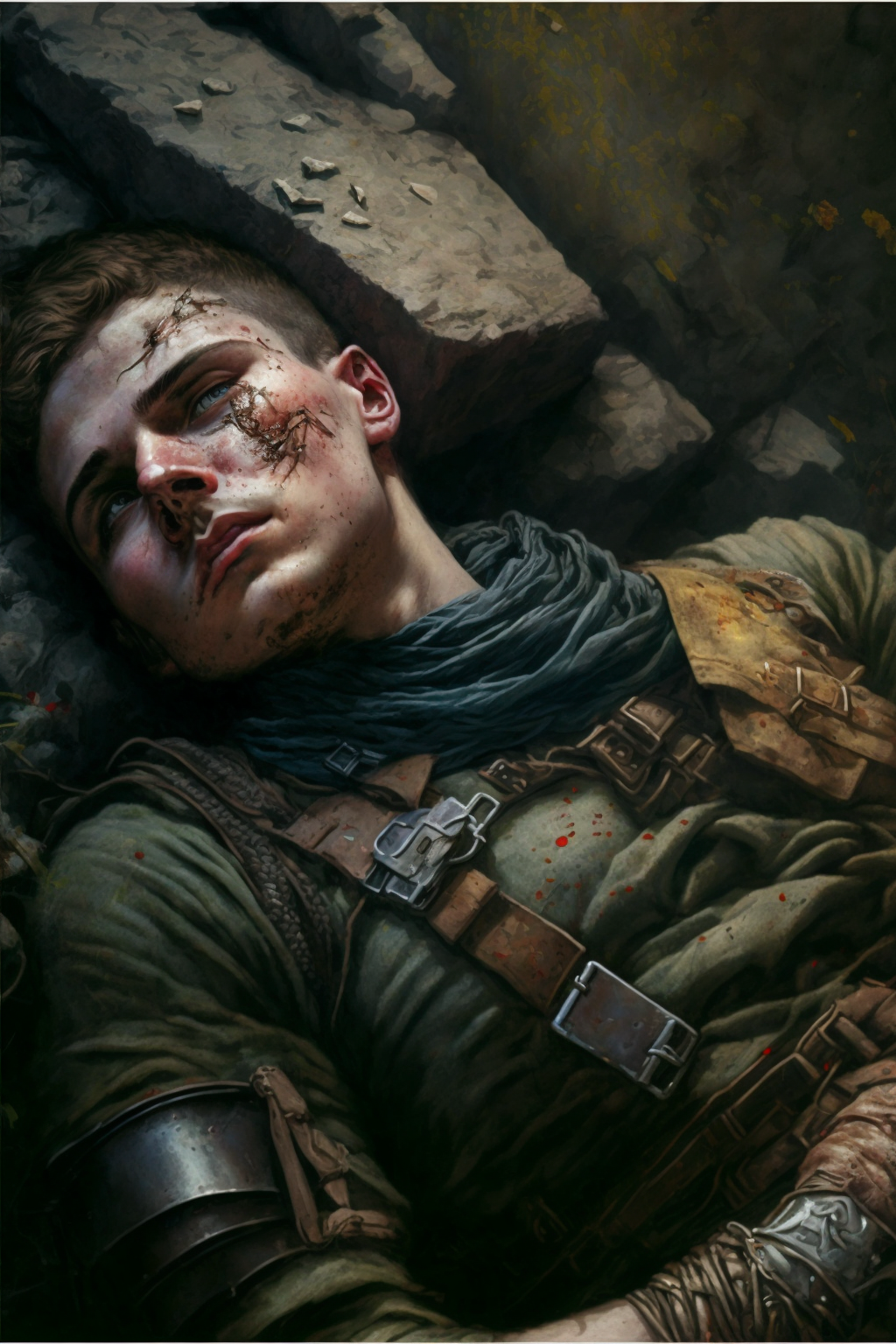


Things to protect
Up the consequences by adding to your encounter something to protect, e.g. an NPC with a special ability, or a secret.
| d20 | Thing to Protect | Description |
|---|---|---|
| 1 | Bystander | The more pitiable the better: a child separated from their parents, a young princess, a servant or poor merchant (who just shared their whole sob story), a brother and sister, a young mother with a baby, an injured puppy, unicorn, or newborn cubs separated from their mother—yes, you do dare do it! To be particularly egregious and potentially campaign changing, make it a baby T-Rex or a grey render. For a terrible twist, have the bystander be a disguised foe that attacks at the worst moment, such as a mimic or something created by an oblex, or a fiend in disguise. This encounter comes pre-loaded with consequences as orphans may become attached to the party! At the very least, it offers a chance for a funeral scene, which could be very touching, and always big time hero moments, stepping in front a ravenous attacker, or taking a deadly blow for an innocent. Consider rare divine intervention, or local intervention (e.g. other bystanders picking up clubs and engaging) when players act with courage and heroism. Use this option often, but vary the scenario so it feels fresh each time. Make sure to explore the consequences after the battle. |
| 2 | Bodyguard duty | Protect someone who needs protection. Make them politically significant, such as an election candidate, the exiled true heir who seeks to bring down their evil aunt's rule, or a witness against an evil baron, merchant, or crime syndicate. They may be the only survivor of a raid or recent assassination attempt. They may have valuable skills such as clairvoyance, prophesying, wealth, or influence. They could also be a young bride fleeing a terrible arranged marriage or slaves escaping their taskmasters. Create a hero moment. Allow PCs to try to talk and trick their way out of trouble, but keep escalating the encounter with more enemies showing up, who are getting more and more nosey. Let players attempt to disguise their ward by crossdressing them, or whatever means they can think of. This kind of encounter can be super high tension without any shots fired, especially when players choose to stand up to the posse. You can even do something endearing like let the ward have a crush on one of the older players, or craft a hand-made gift for the player as a token of their thanks (which is really meaningful as a remembrance if they die). |


| d20 | Thing to Protect | Description |
|---|---|---|
| 3 | Scroll | PCs have been given a high-value spell scroll which is necessary to win a battle, save a village, save a life, etc. Ideally, it should be worth far more money than the players have. The PCs have been asked to deliver it into the hands of people who desperately need it. PCs can use stealth, disguises, deception, and speed to avoid pursuers and ambushes, though, eventually (of course) initiative will be rolled. Enemies will do all they can to destroy the scroll, including start forest fires, conjure elementals and sleet storms, and so on. Ideally players escape the encounter by creating diversions and distractions. |
| 4 | Land grant or pardon | (Similar to above example) PCs are to deliver an official decree granting a group of refugees official sanctuary from their oppressors. Enemies seek to prevent it from reaching a local magistrate. |
| 5 | Food | The enemies are only after the players' food. If they can conjure food or cast goodberry, then make it enough food for a whole host of people. It could be a cartful, or players could be encumbered by the weight. Drop the food and run (and let the people starve this winter? (The wolves would not pursue.) Decisions! |
| 6 | Medicine | Medicine or spell scrolls of lesser restoration to end a plague are a great deliverable, especially if the PCs have no cleric or paladin. In that case, the cleric or paladin could be the deliverable. |
| 7 | Pregnant woman | She needs medical attention and the baby is coming soon. The baby may be breech, or if it is born here, beasts will try to kill it. Players may need to help deliver the baby mid-combat. |
| 8 | Endangered species | It could be a valuable breeding line of horse or other rare animal. Enemies or poachers want it. Plus, it's cute. |
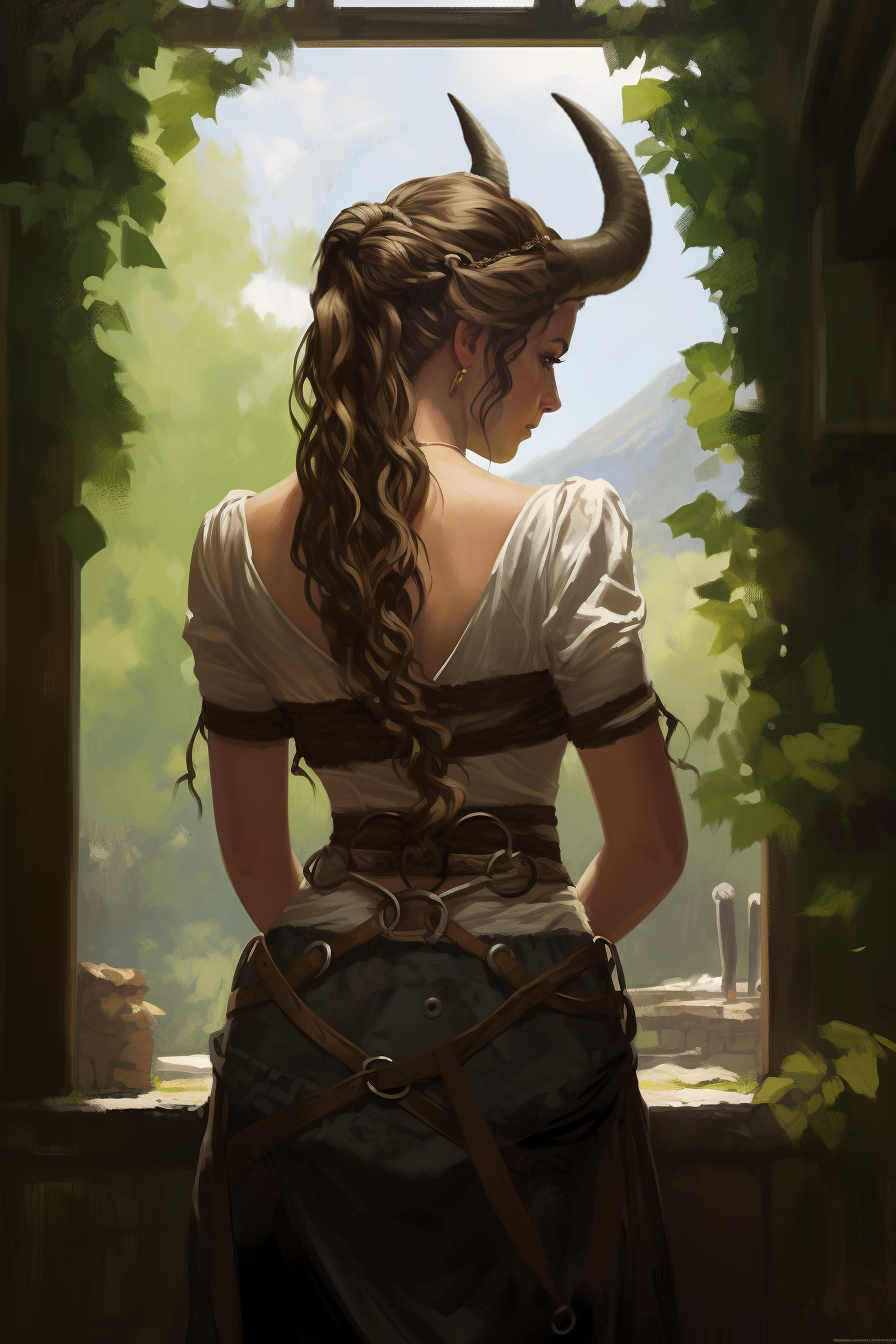


| d20 | Thing to Protect | Description |
|---|---|---|
| 9 | Outlander | Could be a tiefling or other otherwordly, unwelcome visitor. Could be a reformed mindflayer—anything! A nice giant or troll. Whatever engenders local hatred and prejudice. Perhaps this is an emissary from enemies that conducted a recent raid who is trying to reach a city to negotiate a truce, but warmongers and haters want to see it dead rather than negotiate. This allows the creature a chance to explain and explore its feelings as an outsider. A great way to let players deal with issues of prejudice. |
| 10 | A recipe | Yes, that secret recipe for butter crisp buns—it must not fall into unworthy hands! Mephits, fairies or something similarly peksy may have been summoned to retrieve it. |
| 11 | Map or key | The PCs obtain a magic key or map to a keep, treasure horde, secret prison, temple, or dungeon. If word at the tavern gets out that they have it, everybody is a possible enemy. Trust no one. |
| 12 | DJ/MC | Players have been tasked with getting an MC, DJ, or other entertainment for a party. If they don't bring the singer, soloist, or dancer that others are expecting, everyone will be disappointed. The party must go on! It could be a party for the city's freedom, a 111th birthday, celebrating a cancer survivor, a marriage, or anything suitably fun or auspicious. The players could also face multiple benign, but pernicious threats (e.g. monkeys) while attempting to deliver a cake to a party. |
| 13 | Egg | A pilfered dragon's egg was discovered and needs to be returned, or safeguarded, or kept from its mother. Also, someone needs to cook breakfast. |
| 14 | Bride or Groom | Enemies are trying to prevent a union that could bring peace to an embattled region where rebels are trying to incite instability. Or, a some violent family members don't want to see the Capulets and Montegue's vendentta ended before they have had their revenge. Or, a couple is trying to elope and escape their abusively controlling, or opposed parents. Perhaps the marriage is multi-cultural. Perhaps the local cleric has spoken against it. Perhaps there is a prophecy about the bride's offspring. |
| 15 | Sacred water or lava | A journey to the mountain (or into it) to retrieve lava, water, or ice with special properties to sustain a city or temple's arcane defenses leaves the party with a heavy, but valuable load, that is temperature sensitive. The lava must remain molten, the ice frozen, and the water unsullied. |
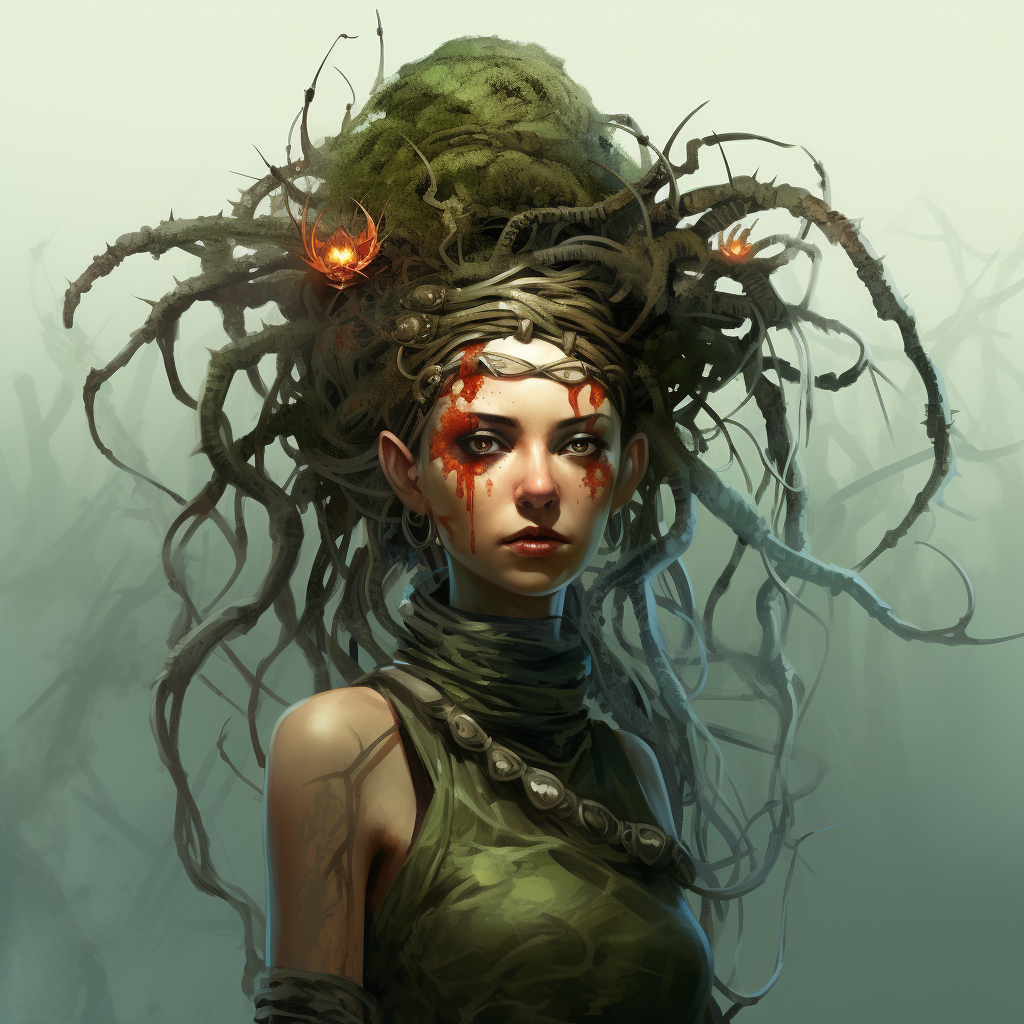

| d20 | Thing to Protect | Description |
|---|---|---|
| 16 | Magical anomaly | A defective magical object is causing random effects, such as a Deck of Many Things that is randomly spitting out cards. It must be delivered to suitable containment facility for disposal or artificer's shop for fixing (perhaps it is very valuable). Bad things happen if it is destroyed outright, such as all many cards being drawn at once. It could be a sentient sword that has gone mad and tries to cut people, a lamp with a trapped Djinn that tries to seduce people into entering it and becoming entrapped, swapping places with the Djinn, a magical item with a particularly foul mouth, or which spreads dissent, pestilence, bad feelings, or which conjures enemies, drains health, and so on. (The situation will doubtless degrade and escalate as soon as the PCs are far from help.) It could also be a person with an interesting curse or disease that needs care or to be studied to prevent spread of the disease or identification of the cause. (What will their condition cause them to do if they become frightened?) |
| 17 | Concert or cruise tickets | Gambling, by lottery, or by bequeathing from a grateful recipient of aid, the PCs have won tickets to a once-in-a-lifetime experience such as a cruise, vacation home stay, or concert. (Beach episode pending!) But everyone knows they have the tickets. The journey to the venue will be perilous. |
| 18 | Last Will and Testament | PCs are entrusted to deliver a will from a safe deposit to the executor. They will be bribed, enticed, delayed, and ambushed in an attempt to replace the true will with a fake one. This is an easy follow on to a combat in which a dying NPC hands over the will. |
| 19 | A dead body | PCs are delivering a "mostly dead" body for burial. Other people are trying to take the body and cast speak with dead to get answers from it, or turn it into a zombie, defile it, use it for arcane experiments, or extract essence from its blood. It is "mostly dead", meaning it occasionally comments on things. For some reason it's spirit is lingering. It is suspected that the spirit may become a ghost. This clerical anomaly should be studied, though the PCs may have to disguise the body from customs searches for fear of being accused of being killers, and so on. Over time, it gets creepier and creepier and begins prognosticating doom on the players, and predicting things that actually happen, perhaps even causing them. |
| 20 | A large group | This is similar to item 1, but larger in scope. The large group is more vulnerable to attack from wolves, bandits, or other enemies. And there is drama. See, e.g. Dark Tower Ascent "Daily Drama" and "Trail Encounters", "NPC quirks", and "Community Troubles" resources. |
Step 3: The Other Side
Villains become three dimensional, believable, and even more terrifying when they are the hero of their own story.
For each encounter, consider the antagonists' motivations.
- What do they want most? (And why are they right for wanting it?)
- What are they willing to do to get it? (What is their style of engagement? How do they handle problems?)
- What are they not willing to give up? (What are their limits, or their scruples?)
- What were they doing before the protagonists show up?
- What sort of banter will they engage in, in combat?
- How will the villain end combat? Will they spin or twist any result to their advantage?
Let's break it down with detailed examples and discussion.
Not.
Let's just make some random tables.
What does the villain want?
| d12 | Want |
|---|---|
| 1 | Safety and security for their family |
| 2 | What rightfully belongs to them through inheritance or legal acquisition |
| 3 | Safety and stability of their realm at all costs |
| 4 | To look good their superiors. |
| 5 | To avoid any bad news that would besmirch their reputation |
| 6 | To hide their past misdeeds from friends and family; news of which would disrupt their harmonious situation. It is preferable to keep things in the past in the past. |
| 7 | Control. When they are not in control, no one is. Threats grow unchecked. Control is prosperity. |
| 8 | Just a few well-deserved luxuries, and if their regular salary and earnings won't do, you can't begrudge them a side hussle or two. |
| 9 | Loyalty and trust. Those who are disloyal and can't be trusted are a hazard and a liability to their benevolent overseership. They should be put out of their places, silenced, or otherwise dealt with for the greater good. |
| 10 | Peace. Disturbances to the order of things are undesirable and should be dealt with quickly and efficiently. |
| 11 | Avoid unnecessary attention. That means keeping quiet about problems. |
| 12 | To prove their worth and strength. They can make change happen. They can deal with adversity. They should be trusted and empowered with greater responsibilities. |
How will they handle problems?
| d10 | Problem Solving Style |
|---|---|
| 1 | Immediate, decisive action with overwhelming force. Shock and awe. Then blessed silence (save the applause of their lackeys). |
| 2 | Blame someone else. They will try to frame their enemies and cast them as evil-doers, lawbreakers, disturbers, and untrustworthy, dangerous, miscreant vigilantes. |
| 3 | Test the waters. They will send out forces of increasing strength, risking their least powerful pieces before risking their valuable pieces. |
| 4 | Know your enemy. This villain will study their enemy, find a weakness and squeeze. |
| 5 | My enemy's enemy is my friend. This villain will ally with others that oppose their foes. |
| 6 | Play both sides. This villain specializes in telling people what they want to hear, double talk, two-faced lies, half-truths, and all manner of politics of the worst kind. They don't want everyone on their side, even if they have to twist their own words and soul into knots to do it. |
| 7 | Vows. This villain swears oaths and makes immutable goals. They will pay whatever cost to get what they have vowed to accomplish. |
| 8 | Weaseling. This villain will pry for information, do guerrilla tactics, and gradually undermine their foes, winnowing them down with problems that tax their resources as they work them into an inevitable corner. |
| 9 | Win-win. This villain seeks to help all parties by striking a bargain that is good for everyone (but just a little better for themself). |
| 10 | Don't bother me. This villain expects their underlings to handle all issues and doesn't look too closely into the dirty deeds necessary to execute their will. |
How far will they go?
(You can use this for minions also.)
| d6 | How far? |
|---|---|
| 1 | Only until their skin or coin are risked, then they turn tail and run, or negotiate, or convince someone else to risk their neck. |
| 2 | Will risk their personal wealth and health in order to protect their allies and family. |
| 3 | Will risk only a reasonable amount. Their minions are hard-earned and should not be risked without a commensurate reward. |
| 4 | Will exhaust all legal means (fair or corrupt) means before resorting to illegal methods. Beware the lawyers! |
| 5 | Attrition is an acceptable cost of doing business. They will trade a life for a life all day long. |
| 6 | Whatever it takes Any cost is worth protecting their invaluable name and repution. |
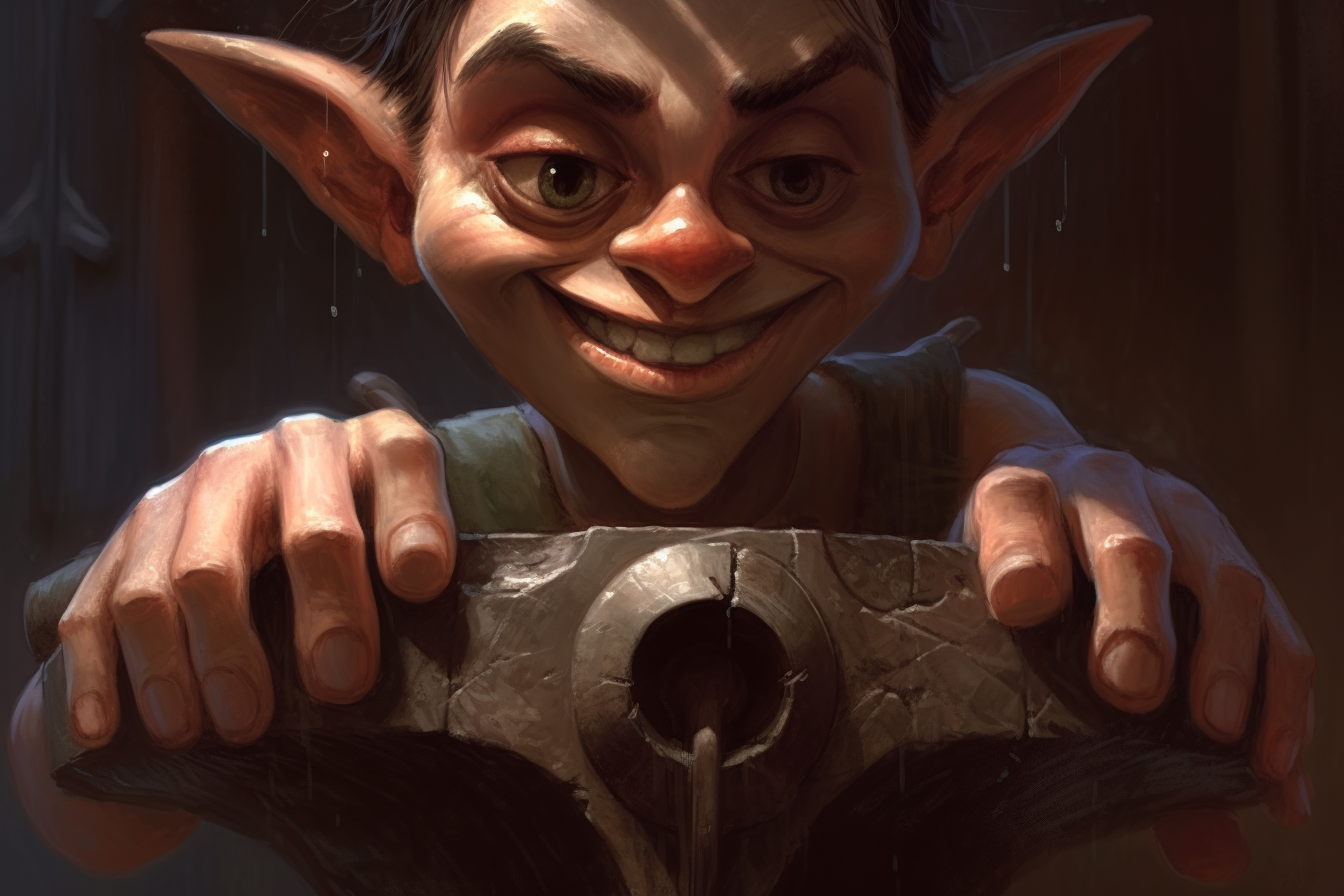

Witty Banter Style
| d6 | Banter style |
|---|---|
| 1 | Irrational denial. "'Tis but a flesh wound. I've seen worse." |
| 2 | An unending stream of hoity-toity insults. "Your swordplay worse than a toddler with spoon. Your defense is pathetic. Your footwork attrocious. And your breath—do you realize that we are supposed to eat cows, not their dung?" |
| 3 | Patronizing false praise. "A fair strike. But not good enough. Allow me to demonstrate." |
| 4 | Yelling at underlings "Get them, you idiots. Stop them!" Or, "She just shot me! Get her, now." And, "How did you miss? He is right in front of you." |
| 5 | Stolid confidence. This villain will merely beckon with their hand, inviting their foes to "bring it on," whereupon they immediately unleash their most violent attacks. |
| 6 | Insufferable complaining. "I'm bleeding! Do you see it? There is blood on my waistcoat. I shall never be rid of this stain." |
Getting Away
| d8 | End of Combat Antics |
|---|---|
| 1 | Vow this is not end, promise retribution, make threats, and reveal their unsettling knowledge of a PCs secret or past, or location of a vulnerable ally, or secret base. |
| 2 | Do something destructive to bring the PCs down with them in one last blaze of glory. "I'll see you all in the Nine Hells!" They will grip a sword implaling them to trap their attacker in the path of danger, take any chance to trade death blows, or release something that will kill them all. |
| 3 | As soon as they are bloodied, they make an appeal to bystanders, pointing to the wanton destruction and violence, and attempt to turn the people against the PCs. |
| 4 | They will make a grand distraction: smoke, toppled goods, reinforcements arriving—anything they can conjure up—in order to escape. |
| 5 | Theatrics. They will likely make a heart-wrenching death speech and then feign death. Or, they could act like they are surrendering to get time use a magic item to escape such as a fly scroll or summoned mount. |
| 6 | They seek to use their enemy's strength against them. They may trick the PCs into using unnecessary violence, or catch hidden bystanders in a blast. They may push one of their own soldiers onto a PC's blade. |
| 7 | Take hostages: PCs if they can get them, or NPCs (bystanders). Or, they will endanger bystanders or captives as a diversion, forcing PCs to divert. |
| 8 | A parting gift. As the villain flees, they unleash something particularly nasty like a fireball, or activate a time-bound trap such as an explosive with a timer, or rising water that will trap PCs, or start a fire, or release a monster or demon. |
Bonus Section: Spice it Up
If an encounter feels boring, add some random excitement.
| d20 | Battle Mishap |
|---|---|
| 1 | New arrivals. Thanks to the noisy battle, a monster has awoken, undead have come following the aura of death, or beasts arrive seeking the scent of blood. The new arrivals can either add enemies to fight (boring) or they can play a role in interfering with movement and the objective. For example, swarms of fleeing rats could make difficult terrain. Or, a rampaging giant could be tipping trees over at random. |
| 2 | Spiteful rivals eager to see the PCs fail arrive in the midst of battle. They could be survivors of a previous fight, rivals seeking the same object, or passing by just in time to tip the battle against the PCs. They might not engage fully, but could be willing to snipe at players, cast dispel magic to thwart defenses, block paths of retreat, cast spells like grease or web to slow PCs, heal or haste enemies, and so on. |
| 2 | Say hello to my little friend. Release pint-sized enemies onto the battle-field. They could be sprites, gnomes, flying monkeys, tiny animated objects, etc. They should be doing annoying things like attempting to steal from packs, pantsing PCs, making difficult terrain to slow or trip PCs, or ganging up to lift PCs into the air (once enough have grappled the PC). Cute animals are even better because PCs are loathe to kill them. |
| 3 | Collateral damage. Combat takes a toll on the battlefield. Add lair actions with stonework or bricks falling from walls or the ceiling, holes opening up in the ground, bridge sections collapsing, stonework. Falling debris could make difficult terrain, fall hazards, places for enemies to hide and so on. A glacier could collapse, an avalanche trigger, a river overflow, dam break, trees fall, tunnel cave-in, and so on. |
| 4 | Where there is smoke, there is fire. Similar to Collateral Damage above, take cues from the attacks and spells used by PCs and enemies. Fire spells should start fires. Missed attacks should cause breaks in the floor or walls. Ice spells could shatter stonework or icicles could fall from the ceiling. Thunder damage could shatter glass. Make a secret roll for mishaps (5-6 on a d6) after each attack. Add smoke to battles to create heavily obscured areas and force Con saves against levels of exhaustion from smoke inhalation. Dust or papers could get stirred up causing disadvantage on attack rolls or allowing enemies to hide. |
| 5 | Innocents fleeing. Amid the rubble innocents can be found that need medical assistance, help to move, or cover from the attackers while they move off the battlefield. They could also be animals fleeing. This one is a great chance for PCs to make a new NPC acquaintance, or love interest (or even a sneaky spy villain) and perfect for a first battle in a campaign. |
| 6 | Spielburg moment. When fighting a (by-now boring) monster that is about to attack a PC, a bigger monster shows up to eat that wounded one. Then the dynamic of the fight changes to a chase with the big monster pursuing fleeing PCs. |
| 7 | Looters. NPCs or rivals arrive to loot corpses or the horde while the PCs are still fighting. |
| 8 | Help arrives (sort of). Rivals or enemies arrive to offer assistance...for a price. This is perfect for changing an encounter that is looking like a TPK into one that will create lots of roleplay and drama. This introduces costs and choices to a combat. |
| 9 | Wild magic. Too much use of magic has made spells unstable in the area. Roll on the wild magic sorcerer's wild magic table each time a spell is cast. |
| 10 | Loot drop. Have something valuable become uncovered or revealed in the midst of combat, something that PCs and enemies want. Then combat centers on getting the object and not dying. This is particularly effective in a combat with hazards like locked doors or flooding in progress, when the "loot" is a key, shutoff mechanism, or flying mount to escape. |
| 11 | Whiny villains. Villains could simply stop attacking and whimper and whine and beg for their lives, accuse PCs of being horrible, violent people, or wail and bemoan their fallen comrade and refuse to fight any further. Could turn into a touching (or silly) roleplay moment. |
| 12 | Mud wrestling. Something in the environment has caused a lot of water to be released. Could be a melting ice spell, a cracked water tank or cistern (or sewer tank), rain or recent rains, a diverted stream from a fallen trees, or a spell—whatever the cause, the area is now muddy and has the effect of the grease spell. Characters can also fling mud as a ranged attack action to blind targets. |
| 13 | Stop to bargain. Villains could stop the fight to attempt to bargain. Minions could sell out their boss, for a price, or offer to lead PCs to safety (or into an ambush) in exchange for their lives. |
| 14 | Insidious after effects. Just to be cruel, you can add late-evolving effects from attacks. What seemed like weak saber or arrow strikes were actually loaded with terrible poison. Suddenly these little attacks are deadly. Players must make three successful Con saves to avoid the Poisoned condition, before they make three failed Con saves, whereupon they are poisoned and become unconscious (optionally dropping to 0 HP to start making death saving throws). Other after effects could be blindness, increasing paralysis, delirium (confusion spell effects), or madness (see DM's guide to Better Roleplay through Stress Effects for subtle examples of madness. Bleeding (loss of HP every round) is an option. For a horror-style effect, have a monster grow and emerge from the victim's wound, which then attempts to devour what it is still attached to. |
| 15 | Split the party. See goal and hazard table #14 "Reunite the party." You can also split off just one PC, which makes it even more intense, though arbitrarily cruel. |
| 16 | It's a trap. Have the easy/boring enemies retreat in all directions to the edge of the battlemap, then drop a forcecage spell on the PCs, or cloudkill, sleep, hypnotic pattern or another entrapping spell. (Or several incapacitating spells at once.) Activate an antimagic field. Drop a net. Release a big monster. Or, drop everyone into a pit with better monsters. (Yes, you are shamelessly making this up, but it's your prerogative.) |
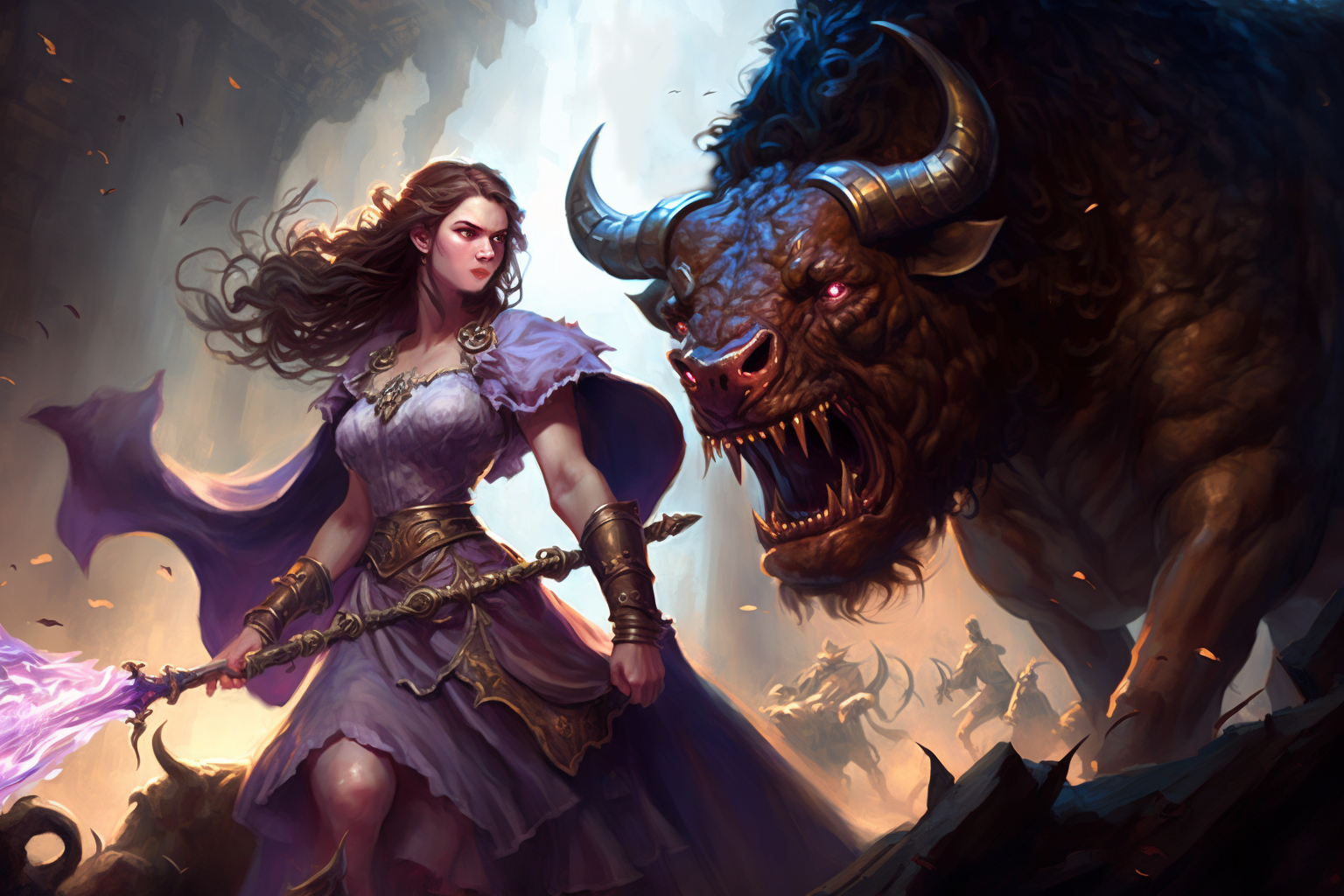

| d20 | Battle Mishap |
|---|---|
| 17 | Divine Assistance ...for the enemy. An agent of a god worshipped by the enemies arrives to even the playing field. This being is effectively immune to the PCs attacks, but serves to punish PCs who damage enemies with hobbling attacks and spells. The being's goal is parity: a life for a life. Negotiation is an option, as is imploring their own gods for assistance. Banishment works. Fleeing also works. |
| 18 | Heckler. Rivals, annoying teens, an old fogy or former adventurer—whatever—they arrive to comment and kibitz on the PCs fighting styles and tactics. This make the fight more about style than about the outcome. The Heckler could give tips and points to the enemies like, "There is hiding over there, you fools." And, "Here comes a fireball. Everybody duck," which grants enemies advantage on saves, etc. The heckler should be clearly an innocent that should not be killed by anyone of good or neutral alignment. If the same heckler shows up in yet another combat unexpectedly, it can be even more funny. They should be eating snacks or drinking and generally unconcerned about any dangers, but could become endangered by the enemies. |
| 19 | Send out your champion. In this David vs. Goliath style twist, the enemies retreat and propose the victor should be decided by solo combat. First the PCs choose their champion, then the enemies (you) reveal their champion (which you select to be just hard enough for the chosen champion). It should look imposing. Other players can assist their champion with bardic inspiration, Insight checks to predict what attack is coming, subtle spells, distractions (Performance check), and so on. Enemies will ready ranged attacks in case PCs choose to interfere. A big part of this encounter is the negotiation of the stakes. What does each side get if they win? |
| 20 | Call for help. In this twist, news arrives from an NPC, sending spell, skywrite spell, or animal messenger of a raid or attack in progress, a call for help, or impending attack. PCs must decide what to do, whether to extricate themselves from this battle and journey to help, or to finish the fight and risk being too late. One PC could teleport or leave early, or the party could split. If the party splits, roll for chase complications in the DMG table as the PCs race to the other battle. (Don't start it until the current battle is finished.) Then start the other battle while the other half of the party is in transit. |



Change Log
| Date | Change |
|---|---|
| 2023.09.26 | Initial release |
| 2023.09.27 | Added bonus section: spice it up. |
Image Credits
All images generated using Midjourney tool (v5).
Copyright notice
This is unofficial Fan Content permitted under the Wizards of the Coast Fan Content policy.